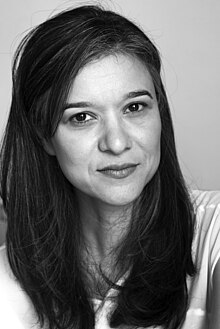Laura Boushnak
Laura Boushnak | |
|---|---|
لورا بشناق | |
 Laura Boushnak 2014 | |
| Born | 1976 (age 47–48) |
| Alma mater | Lebanese University |
| Occupation(s) | Photographer, artist |
Laura Boushnak (Arabic: لورا بشناق; born 1976) is a Kuwaiti-born Palestinian photographer whose work is focused on women, literacy, and education reform in the Arab world. For her ongoing documentary project "I Read I Write" she photographed girls and women changing their lives with education in Egypt, Yemen, Kuwait, Jordan and Tunisia.
Early life
[edit]Boushnak was born in Kuwait in 1976 to third-generation Palestinian refugee parents. She attended public school there until Palestinian children were not allowed to attend public schools in retaliation for the Palestine Liberation Organization's (PLO) support for Iraq's 1991 Invasion of Kuwait. She then transferred to Fajer al-Sabah School, a private Catholic school.[1][2][3]
Career
[edit]After completing a BA in sociology at the Lebanese University in Beirut in 1997, Boushnak began her photography career covering news for the Associated Press agency in Lebanon. She later worked as a photo editor and photographer for the French news agency Agence France-Presse (AFP)[4] at its Middle East hub in Cyprus and its headquarters in Paris. Her nine-year wire experience included covering hard news in conflicts such as the war in Iraq and the 2006 Israel-Hezbollah war. Her photographs have been published by many international newspapers and magazines, such as: The New York Times,[5] The Guardian,[6] The Washington Post,[7] and Le Monde.
After covering the 2006 Israeli/Hezbollah[8] war for AFP, she witnessed how many people, including her own family and close relatives, had to flee their homes and seek refuge. When the war was over, Boushnak started the project "Survivor"[9] a story of Mohammed, who was trying to embrace his new life after losing both legs in a cluster bomb incident.
Since 2008 Boushnak has been working as an independent photographer, devoting more time to her long-term projects, one of which is a broad, ongoing one, titled "I Read I Write".[10] The project shows successful and independent women from the Arab region who changed their lives through education while exposing and questioning the barriers they face. These women are seen as a source of inspiration in their own communities and beyond. With this project Boushnak wanted to expand her means of expression by applying a more artistic approach, rather than presenting a socio-political documentation. She engaged the women by getting them to write on the photograph itself.
Her work "I Read I Write: Egypt- Illiteracy series" was acquired by the British Museum in 2012,[11] and by private collectors. It has been exhibited at institutions such as: Arp Museum Bahnhof Rolandseck,[12] Birmingham Museum and Art Gallery, MODEM Museum,[13] Sharjah Art Museum and the Contemporary Art Platform, Kuwait. Getty Images awarded Boushnak a special grant for editorial photography in 2014 to continue her "I Read I Write" project.[14][15][16][17]
In 2014 Boushnak became a TED Global Fellow[18] and gave a TED talk about her education project, which went online on TED main website[19] Recently, Boushnak gave another TED talk about the human impact of cluster submunition .[20]
Boushnak co-founded Rawiya collective,[21] the first all female photo collective in the Middle East.[22]
References
[edit]- ^ MacDonald, Kerri (2013-09-10). "Empowering Arab Women Through Literacy". Lens. The New York Times. Retrieved 2016-07-13.
- ^ Rosen, Steven J. (Fall 2012). "Kuwait Expels Thousands of Palestinians". Middle East Quarterly. 19 (4). Middle East Forum: 75–83.
- ^ "Laura Boushnak (Biographical details)". British Museum.
- ^ "WOMEN Iraqis sit with their backs to each other at a wedding party in Baghdad 16 October 2003 Pictures". Getty Images. Retrieved 2016-07-22.
- ^ Jilani, Seema (2015-07-10). "Srebrenica Revisited". The New York Times. Retrieved 2016-07-13.
- ^ Smith, Helena (2013-03-22). "Eurozone's mistakes could destroy Cyprus, warns former president". The Guardian. Retrieved 2016-07-13.
- ^ "In Bosnia, Turkey brings back a gentle version of the empire". The Washington Post. Retrieved 2016-07-22.
- ^ "Middle East Crisis Spurs World Reaction Pictures". Getty Images. Retrieved 2016-07-22.
- ^ "laura boushnak – survivor". 2009-03-30. Retrieved 2016-07-22.
- ^ SanaGallery (2015-04-20). "CNN | Laura Boushnak | Photographer showcases women's education in the Arab". Retrieved 2016-07-22.
- ^ "I read I write". British Museum. Retrieved 2016-07-13.
- ^ "Menschenskinder". Arp Museum Bahnhof Rolandseck. Retrieved 2016-07-22.
- ^ "Modem Museum". Roberto Alborghetti. Retrieved 2016-07-22.
- ^ Padley, Gemma (2014-09-05). "Getty names 2014 Grants for Editorial Photography". British Journal of Photography.
- ^ Estrin, James (2014-09-04). "Getty Grants for Personal Photo Projects". Lens. The New York Times.
- ^ Conway, Richard (2014-09-04). "Top Photographers Win $130,000 Worth of Grants". Time.
- ^ "Laura Boushnak 2014 grants recipient". Getty Images. 2014-09-05. Retrieved 2016-07-13.
- ^ Eng, Karen. "For these women, reading is a daring act: Laura Boushnak | TEDFellows Blog". Archived from the original on 2015-09-11. Retrieved 2016-07-13.
- ^ Boushnak, Laura. "Laura Boushnak | Speaker | TED.com". Retrieved 2016-07-13.
- ^ "The view from the mountain: Notes from the TED Fellows session at TEDSummit". 2016-06-27. Retrieved 2016-07-22.
- ^ "Rawiya | She Who Tells a Story exhibition ending Oct 16 - Gulf Photo Plus". Gulf Photo Plus. Retrieved 2016-07-22.
- ^ "About". Rawiya Collective. Archived from the original on 2016-08-16. Retrieved 2016-07-13.
External links
[edit]- Official website

- "Laura Boushnak Pictures". Getty Images.
- 1976 births
- Living people
- 20th-century Palestinian photographers
- 20th-century Palestinian women artists
- 21st-century Palestinian photographers
- 20th-century Palestinian journalists
- 21st-century Palestinian journalists
- Palestinian photojournalists
- 21st-century Palestinian women artists
- Lebanese University alumni
